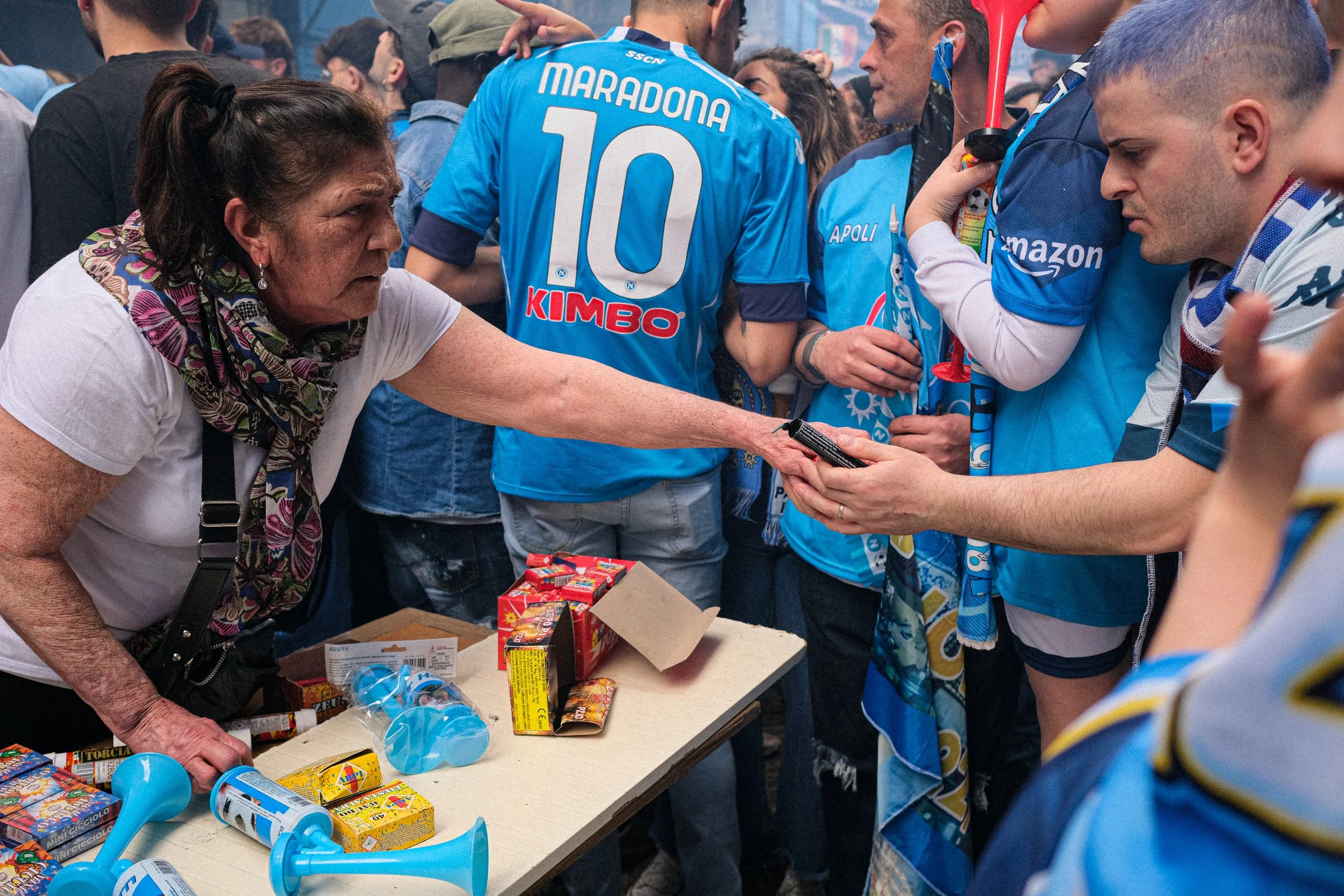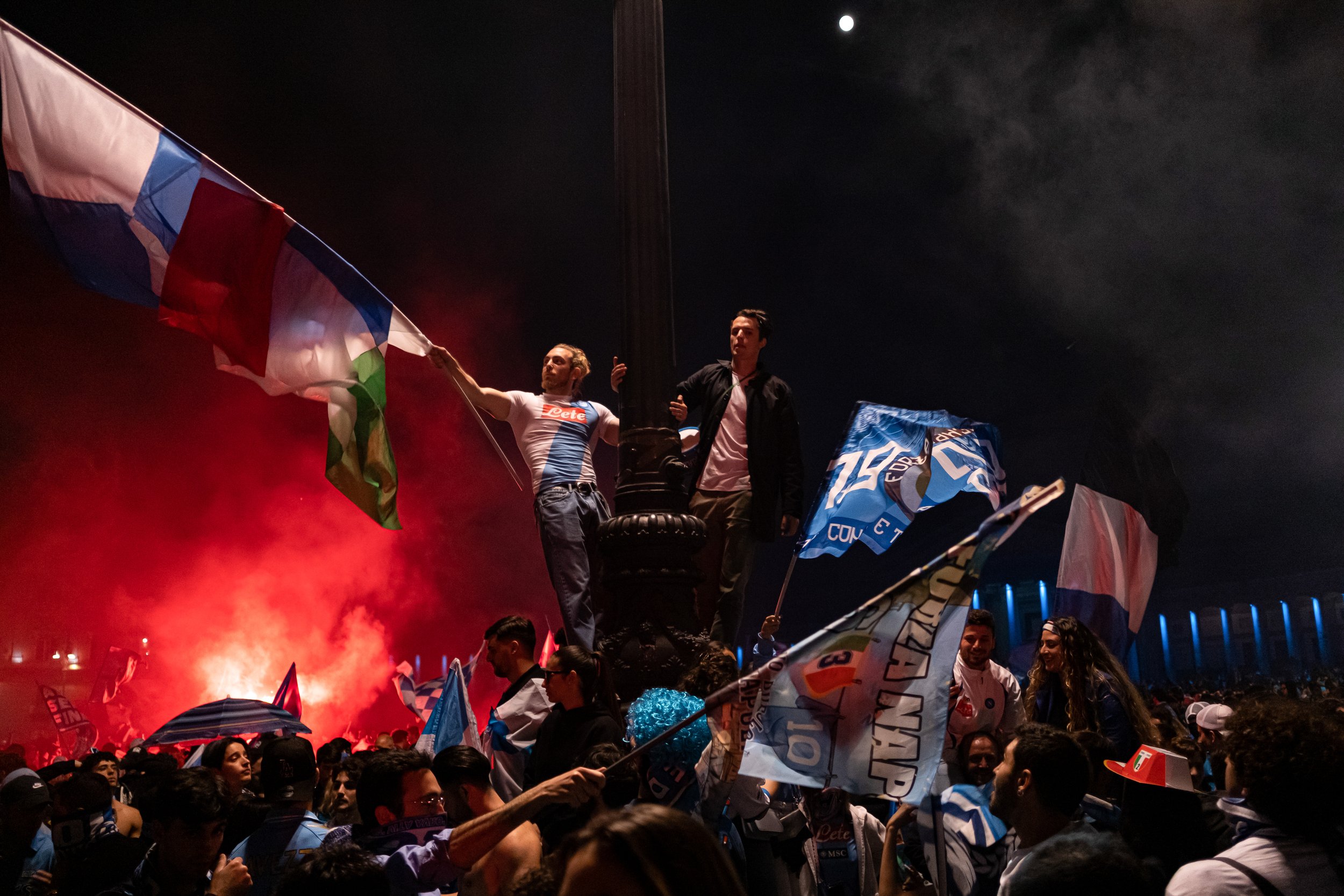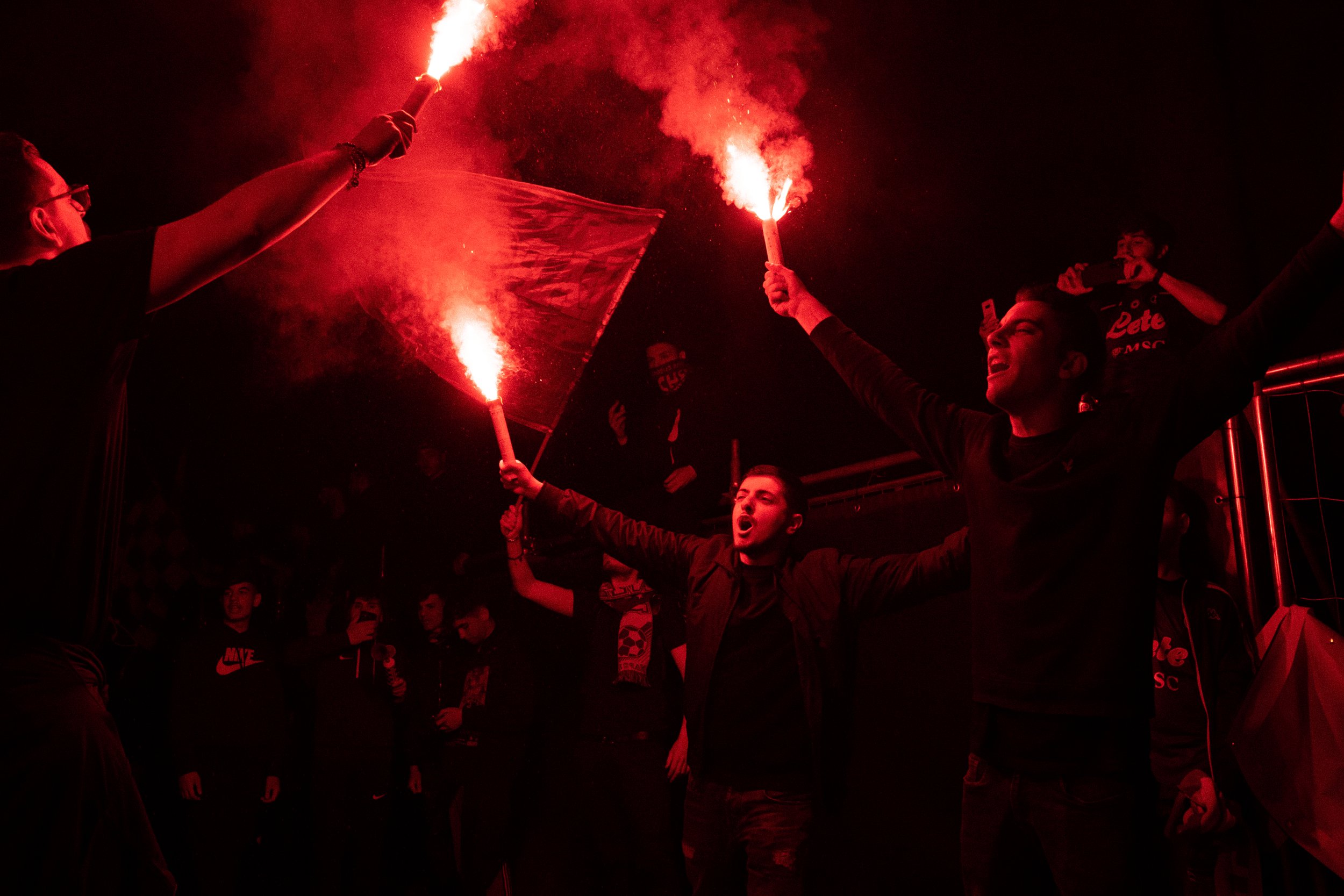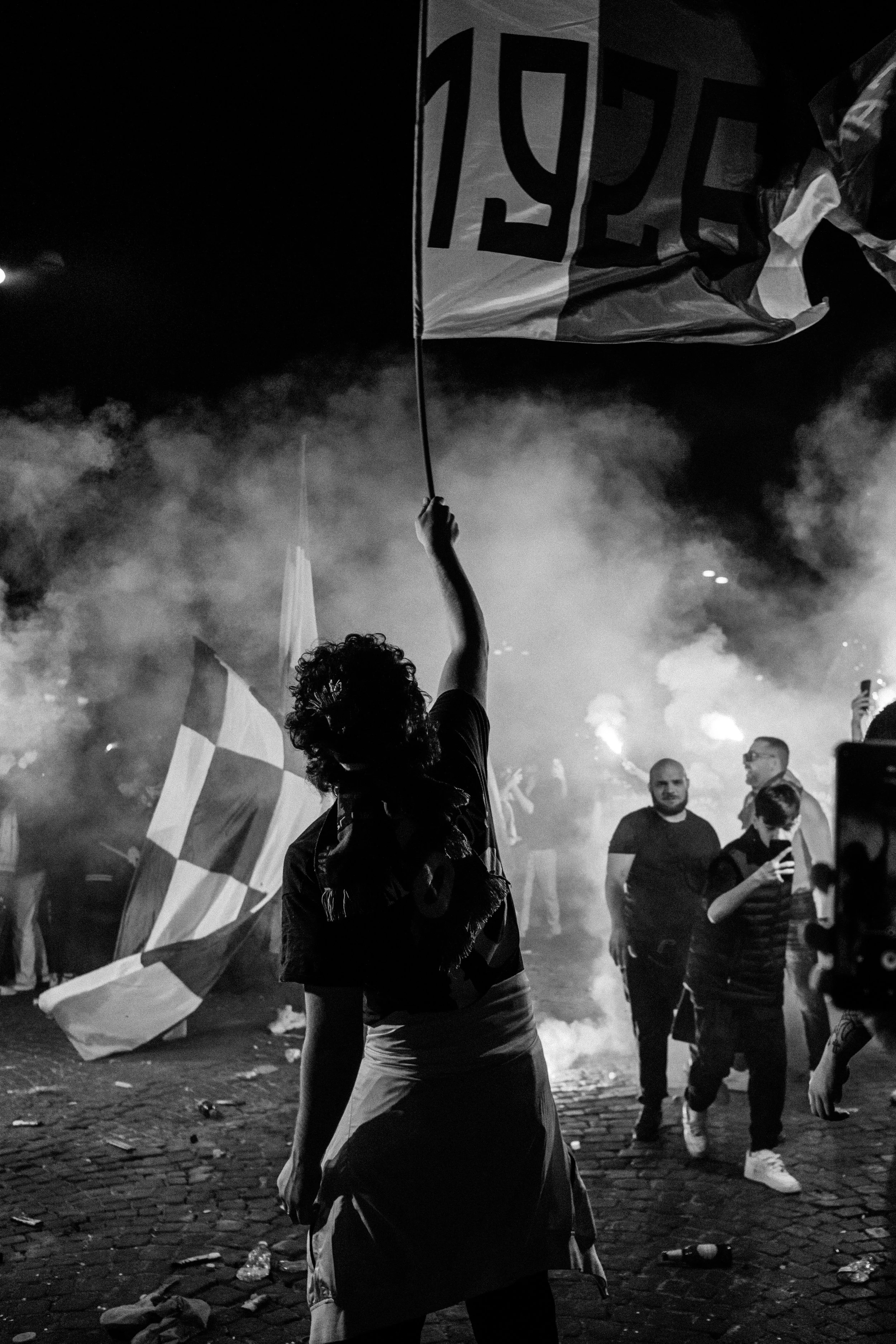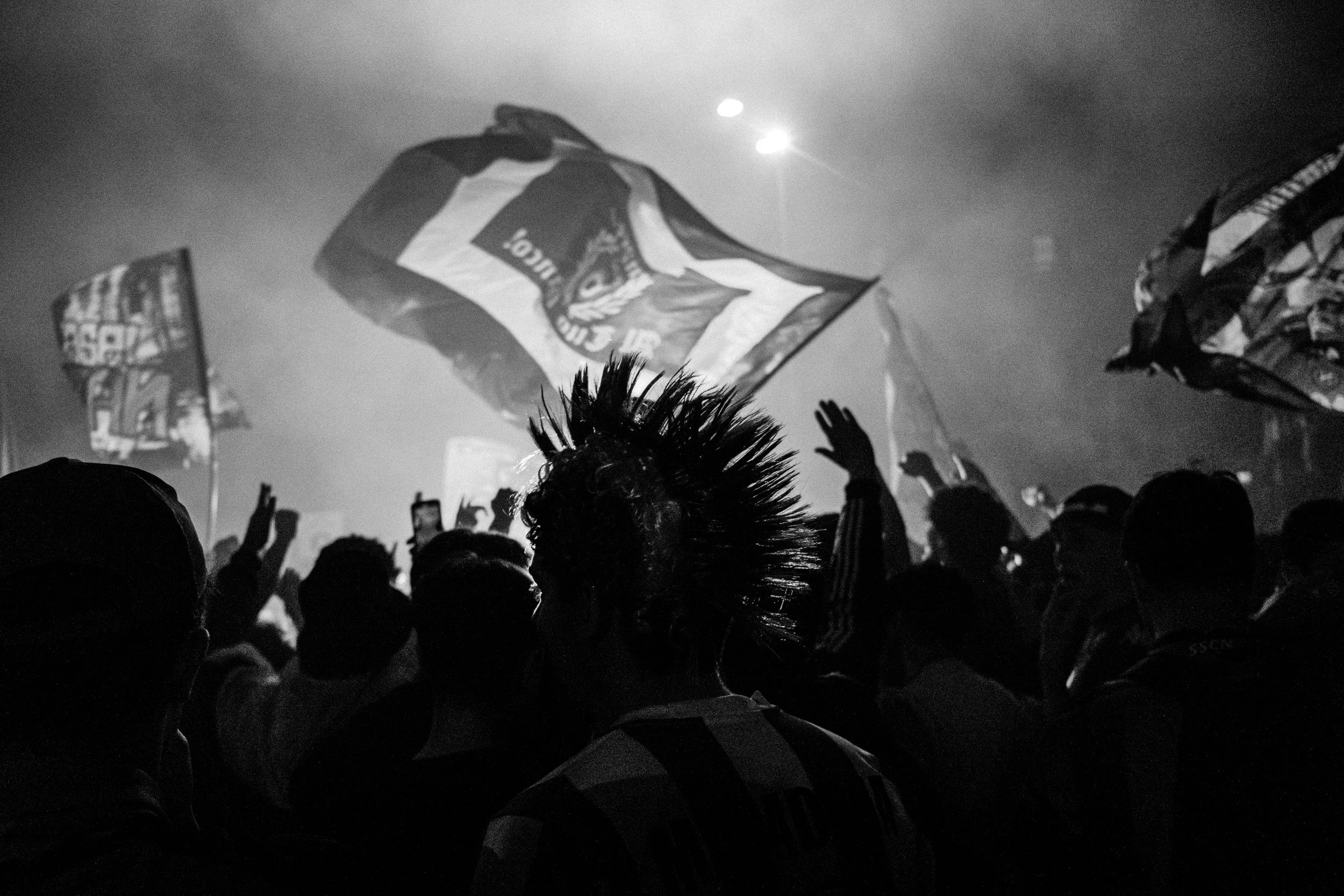
Revenge against creation.
Becoming legends
On 5 July 1984, a young Argentinean player was officially presented at the Stadio San Paolo in front of eighty thousand people. That young man was Diego Armando Maradona. One of the most beautiful pages of football history was being written.
Diego was coming from a fluctuating experience at Barcelona. Despite his goals, numerous injuries had compromised his young career. After many disagreements with the club, Diego was signed, not without a few compromises, by the Italian club Napoli for 13.5 billion lire.
Under the leadership of Ottavio Bianchi, Napoli won their first Scudetto in the 1986-87 season, when they defeated Juventus after thirty-two years. On 10 May 1987, the Neapolitan club earned a 1-1 draw in their home match against Fiorentina, mathematically securing their first championship triumph. Napoli also won its third Coppa Italia, winning all 13 matches. The feat of winning both the Scudetto and the cup was an achievement that until then had only been achieved by Grande Torino and Juventus. In the following two seasons Napoli won a European Cup and finished second in the league twice in a row.
The 1989-1990 season saw Napoli regain their second league title, but shortly afterwards, Maradona's experience with Napoli came to an abrupt end when he tested positive in a doping control. Despite the controversy and controversy, the Napoli of those years will always remain a landmark in Italian football, remembered for its triumphs and unforgettable exploits.
The city of Naples and its God
Today, the figure of Diego is almost naturally associated with the city of Naples, but the relationship between Naples and Diego was not always as we know it today. Like the most beautiful love stories, this story has known many ups and downs. The city and its people first considered him a loser, almost a traitor, then, years later, the Dios figure was revived in the imagination, as a mystical figure, and mystical figures in Naples are like saints. And Maradona became, at a certain point, a saint.
Today, the city venerates his myth through the memories of the people who lived him. In the stories of the citizens, Diego was truly a God come down to earth. What he achieved has few equals in the history of football. A man alone against all. Diego represented the redemption of thousands of young people who saw in him a hope and a way out of a society that regarded them as last. His humanity, his struggle against adversity and his rebellious spirit resonated deeply with the people of this city. Maradona embodied the very essence of Naples: passionate, lively, unstoppable.
On 25 November 2020, the world mourned the loss of one of the greatest footballers of all time, but in Naples the grief took on an even more intimate and profound dimension. His legacy lives on in the colourful alleyways of Naples, in the lively piazzas and murals depicting him. Every corner of the city tells a story of Maradona: from the fans' chants at the stadium that now bears his name, to the votive chapel in the Quartieri Spagnoli where the faithful light candles and pray in his honour. Years after his death, his presence is felt everywhere.
Live, die and be reborn
In the annals of football, few stories are as dramatic and surprising as that of the Società Sportiva Calcio Napoli, a team that has known the highest peaks and the darkest depths of Italian football.
After the golden era, Napoli faced a period of unprecedented crisis. The departure of the Pibe de Oro left an unbridgeable void and the club struggled to regain its identity and competitiveness. Subsequent management, often marked by financial problems and questionable choices, brought Napoli to the brink of the abyss. The year 2004 was the lowest point in the club's history, when SSC Napoli plunged into bankruptcy and found itself relegated to Serie C1. However, as often happens in moments of greatest despair, it was precisely in that period that the spark of rebirth was ignited.
Aurelio De Laurentiis, a well-known film producer and football fan, entered a world completely new to him. With a bold vision and unwavering commitment, De Laurentiis took over the club and began a process of renewal and revitalisation. Targeted investments, shrewd management and iron determination were the key ingredients of this rebirth.
The first tangible sign of change came in 2007, with promotion to Serie A thanks to the efforts of coach Reja and emerging talents such as Ezequiel Lavezzi and Marek Hamsik. From then on, Napoli began to climb the ladder, consolidating its position on the Italian and international football scene. In the following years, under the leadership of such prestigious coaches as Walter Mazzarri, Rafa Benítez and Maurizio Sarri, Napoli regained its leading status. Important results followed, both in the league and in European competitions, but the most coveted goal remained the Scudetto. With unstoppable determination, the club continued to work hard and a few years later, under Luciano Spalletti, the long-awaited moment arrived. Napoli, with an extraordinary season, won the third Scudetto in its history, filling a gap that had existed for 33 years.
4 May. 10:37 p.m.
The year of the Scudetto was an incredible year. I remember that every game was a unique event that united thousands of people, which is what I like most about football really. Watching the matches in the streets of Naples or at the homes of Neapolitan friends was a privilege that I will always treasure.
I remember the 18th match. Perhaps the most beautiful night for the Neapolitan people: the historic 5-1 win over Juventus, a match that will remain in the hearts of the Azzurri fans for a long time; or the 2-1 win against Roma, the victories in the Champions League and so on. So many pieces of an endless journey, culminating on 4 May at 22:37, the day Spalletti's Napoli won against Udinese and sewed the long-awaited triumph on their chests.
But the victory was also, in a way, delayed. Napoli could have won the Scudetto at home against Salernitana the previous day, but a draw postponed the celebrations. That day I was in Forcella watching the game with hundreds of other people. Napoli had to score one more goal to win the Scudetto. While some continued to celebrate, most people were in mourning.
Even during the last game I was in the streets of Naples. As I write this, I can relive the tension that permeated the air as the opening whistle announced the start of the battle on the pitch. Napoli had to win to secure the Scudetto, and the fans knew it would be a tough challenge.
The clock was ticking, and every minute seemed like an eternity. Then, at the most critical moment, it happened. Osimhen's goal. A collective shout of joy shook the stadium and its surroundings as the ball crossed the opponent's goal line. It was as if time stood still for a moment, before exploding in a jubilation of joy and happiness. At one point the referee whistled the end of the game. It was official. Napoli had won the Scudetto.
That night, after the final whistle, the world seemed to fall apart. I had never seen anything like it. Blue flags waved proudly, choirs resounded through the streets and spontaneous hugs united strangers who had become brothers for a night. The city was in celebration, and nothing could extinguish that spirit. In those moments of collective joy, I felt that more than just a sporting victory, that triumph was a recognition of the identity and resilience of a people. Napoli was not just a football club, but a symbol of hope and pride for the entire city and for all those who call this land home.
Of that night I will always remember the madness, the joy, but also the disbelief. There was a moment when, on my way home, everything seemed to stop. At dawn, the entire city seemed deserted, although there were numerous groups of people in the streets. Perhaps it was just my perception due to tiredness, but after endless hours of partying I just wanted to go home, aware that I had experienced an unforgettable night.
Piero Corvo - Reborn
Naples, Italy. 2023.
Bringing people together: thank’s to Cultura Partenopea
I think the most extraordinary thing about football and sport in general is that it brings people together. When I received the proposal to publish some of my photographs in a project about Napoli's third Scudetto, I was extremely happy. Cultura Partenopea is a photographic archive dedicated to Napoli's last historic Scudetto. A project that combines photos, texts and emotions with the intention of creating an indelible memory to be preserved and leafed through forever. The guys from Cultura Partenopea have produced this extraordinary photo book that includes the photos of more than 80 photographers who lived through those moments. To find out more visit their website. If you want to buy the book, you can do so here.
All photos here:
Follow my journey.






